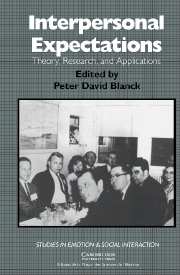Book contents
- Frontmatter
- Contents
- Preface
- List of contributors
- Introduction
- Part I Research on interpersonal expectations
- Part II Research on the mediation of interpersonal expectations through nonverbal behavior
- 11 The spontaneous communication of interpersonal expectations
- 12 The accurate perception of nonverbal behavior: Questions of theory and research design
- 13 Nonverbal communication of expectancy effects: Can we communicate high expectations if only we try?
- 14 Gender, nonverbal behavior, and expectations
- 15 Expectations in the physician-patient relationship: Implications for patient adherence to medical treatment recommendations
- 16 Comment: Interpersonal expectations, social influence, and emotion transfer
- Part III The study of interpersonal expectations
- Author index
- Subject index
- Studies in Emotion and Social Interaction
13 - Nonverbal communication of expectancy effects: Can we communicate high expectations if only we try?
from Part II - Research on the mediation of interpersonal expectations through nonverbal behavior
Published online by Cambridge University Press: 23 December 2009
- Frontmatter
- Contents
- Preface
- List of contributors
- Introduction
- Part I Research on interpersonal expectations
- Part II Research on the mediation of interpersonal expectations through nonverbal behavior
- 11 The spontaneous communication of interpersonal expectations
- 12 The accurate perception of nonverbal behavior: Questions of theory and research design
- 13 Nonverbal communication of expectancy effects: Can we communicate high expectations if only we try?
- 14 Gender, nonverbal behavior, and expectations
- 15 Expectations in the physician-patient relationship: Implications for patient adherence to medical treatment recommendations
- 16 Comment: Interpersonal expectations, social influence, and emotion transfer
- Part III The study of interpersonal expectations
- Author index
- Subject index
- Studies in Emotion and Social Interaction
Summary
To most mortals, publishing one comprehensive and exhaustive metaanalysis would be cause enough to swing triumphantly from the chandeliers. But Monica Harris is, after all, a Bob Rosenthal student, and so she and Bob published 31 meta-analyses in a single paper (Harris & Rosenthal, 1985). From this monumental effort, we now know, with no small measure of confidence, how people act differently when they expect the best from others (compared to when their expectations are less sanguine), and we also know whether these different ways of treating others seem to be associated with good or bad things happening to them. Some ways of behaving seem doubly possessed of these seemingly magical qualities - they are associated with both fond expectations and enviable outcomes. For example, teachers who expect their students to do well (compared to those who are not so optimistic) are more likely to smile at their students; look into their eyes; encourage and praise them; ask them more questions; teach them more material; interact with them more often, more closely, and for longer periods of time; and generally treat them in ways that seem affectionate and hopeful. As Bob Rosenthal has been heard to say, they “warm at” them. Further, students who have been warmed at in these ways seem to reciprocate by living up to their teachers' fond expectations; they do better work than students who are treated more coolly.
- Type
- Chapter
- Information
- Interpersonal ExpectationsTheory, Research and Applications, pp. 261 - 275Publisher: Cambridge University PressPrint publication year: 1993
- 4
- Cited by



